- Home
- Garnett Elliott
The Drifter Detective
The Drifter Detective Read online
Copyright © 2013 by BEAT to a PULP
All Rights Reserved. No part of this book may be reproduced in any form or by any means without the prior written consent of the publisher, except where permitted by law.
The story herein is a work of fiction. All of the characters, places, and events portrayed in this book are either products of the author's imagination or are used fictitiously.
Based on characters created by David Cranmer.
Cover images from Dreamstime. Title page image from Shutterstock. Cover design by dMix.
PO Box 173
Freeville, New York 13068
USA
Praise for "The Drifter Detective" series …
It's a great set-up for a hardboiled private eye series, and Elliott provides the twisty plot … the beautiful babes, and the gritty action that the genre demands.
—James Reasoner
Spur Award nominee and author of Texas Wind
*
"The Drifter Detective" is a wonderfully evocative piece of hard-boiled pulp.
—Andrew Nette
Author of Ghost Money
*
Southern noir done proper.
—Alec Cizak
Editor and publisher of Pulp Modern
*
CONTENTS
The Drifter Detective
BONUS: Fighting Chance
About the Author
More from the series
Also by Garnett Elliott
Other titles from BTAP
Connect with BEAT to a PULP
The Drifter Detective
Jack Laramie glimpsed the farmhand in the DeSoto's dusty rearview. Two hundred pounds of West Texas muscle bulging behind denim coveralls, and the pain of all Creation etched on his ruddy face. He had a ballpeen hammer in his fist, cocked back like a tomahawk. His worn boots slapped pavement as he closed the distance between curb and the DeSoto's driver-side door.
"Shit." Jack hit the ignition. The engine gave a lunger's mournful cough, but refused to turn over. Now he could see the union button pinned to the farmhand's shirt. Too damn close. He waited another second and threw open the door with all his shoulder behind it. The door's handle caught the farmhand in the groin. He swung overhand as he crumpled, his ballpeen making a two inch dent in the coupe's roof.
"Hell and damnation." Jack leapt out, dipped at the knees and brought his right fist up as he straightened into a textbook uppercut. The farmhand shot for watery-clear sky. When his heels settled again he fell backward onto the road, tailbone crunching pavement and the ballpeen spinning sideways from his grasp. He shook his head and reached for it.
Click.
"Think your hammer's faster than mine?" Jack said.
The farmhand blinked at the one-eyed glare of a weathered Colt revolver. Some of the ruddiness left his face. He licked his lips and said: "You done ruined me, Judas."
"You're a fine one to judge."
"Mr. Stahl's throwed out all my stuff, and he ain't paying me for my work the past two weeks, neither. I've got to dust with no money in my pockets. And it's all your—"
"Blame your goddamn pecker," Jack said, easing backward as the farmhand swayed to his feet. Mr. Stahl had hired Jack to keep an eye on his wife, whom he suspected was trysting with the help. Jack had hauled water and cut timber for several days on the Stahl farm, but Mrs. Stahl had seemed chaste as a banker's wife with the workers. Her sixteen year old daughter, however, met regularly with a certain hand behind the grain silo. Stahl had looked ready for an aneurysm when Jack told him.
"You had any honor, mister, you'd give me a cut of what the old man paid you," the farmhand said. "Christian charity."
"Like hell." The twenty bucks in Jack's pocket would just about cover the gas and food for his trip up from Lubbock.
"What am I supposed to do?"
"Clear town, like you said. Stahl can charge you with statutory rape if he wants to. Don't know why he hasn't yet. Now turn around and walk away. Leave that hammer where it is."
Muttering, the hand did as he was told. Jack didn't envy him for having to travel penniless in this unforgiving territory, but he didn't feel any sympathy, either. He slid the Colt back in its shoulder rig and picked up the hammer. "Nice heft," he said, walking around to the horse trailer attached to the DeSoto's rear. He tossed the hammer inside with a clang. No horse whickered back at him.
The engine caught after a minute or so of coaxing, almost flooding the carburetor. Evening would be here soon. The skinned knuckles on his right hand smarted as he shifted and drove the hell out of Cross Plains, Texas, wishing adios to the Podunk little town.
* * *
Ten miles later, the DeSoto started lurching whenever he gave it gas. "Just make it to Abilene," he told the dashboard. "I've got the hint of a job there."
The sun was coming down hard over a sky the color of brushed steel. Scrub oak and flat plain rolled past, with only the occasional sagging telephone pole to remind him of civilization. Late autumn in this arid, open country, and the DeSoto's heater was busted.
The coupe lurched again, so violently this time he almost pulled over. But it was either the transmission or the fuel pump, and neither could be fixed by the side of the road. He cursed, recalling the Pinkerton offer he'd turned down in Dallas three months before. The lure of the open road. Jesus, what had he been thinking?
"Hold together, old son. Hold together."
Thirty nerve-rattling minutes passed. He thought he saw the lights of Abilene winking in the distance, but there weren't enough for a real city. A battered road sign told him he was approaching the township of Clyde. It gave the population in triple digits. He turned off anyway, saw a fair-sized train station along railroad tracks, a cluster of cinderblock houses, and what looked like a garage with gas pumps out front.
Maybe his luck was changing. He pulled in next to the pumps. The garage had a hand-painted, peeling sign proclaiming "Luke's." He got out just as the front door was opening.
"Fill her up?" came an old man's voice from the doorway.
"You open for repairs?" Jack said.
"I suppose. Nothing's getting fixed tonight, though."
The old man came slouching over. He had a Teddy Roosevelt moustache with little spectacles to match, and he limped as he walked around to inspect the trailer. "Where's your horse?" he said, peering into the dark space.
"I'm between horses right now. You must be Luke."
"And you must be a detective, seeing as how you figured that."
"My name's Laramie."
"No shit? Like the cigarette?"
"Yeah," Jack said, fighting back a sigh.
"You must get kidded about that."
"Quite a bit. Especially when I was at Camp Lucky Strike, in France—"
The old man held up his hands. "Hold off on the war stories. I'm not trying to get chummy. I fought the Kaiser myself, and you don't hear me bragging about it to every stranger I meet. Now tell me what's wrong with your heap, here."
Jack gave him the symptoms. Luke nodded, his mouth grim. "Well, we'll get her inside for the night. Help me detach the trailer."
They worked together in silence. Jack eased the coupe into the garage. It had a pinup calendar from 1936 and an oil-soaked dirt floor.
"You know where I could get a drink around here?" he said. "A place to stay, maybe?"
"Drinks first, huh? Got your priorities straight." The old man pointed. "There's what we jokingly refer to as a saloon, half a block over from the crossroads. And the widow Talbot runs a boarding house near the depot, mostly for railroad types. You could try that."
"Thanks." He didn't really want to spring for a room, but he couldn't imagine himself slinking back to the garage and spendi
ng another night in the horse trailer. The old man would probably notice and give him hell.
"Try not to spend all your money, son. I've got a feeling what's ailing your car won't fix cheap."
* * *
The 'saloon' was a windowless box made of yellow-painted cinderblock, with a half-dozen pickup trucks sprawled on the dirt lawn. Jack grit his teeth as he pushed open the door, cringing to Ernest Tubb's "Walking the Floor Over You." Faces turned to regard him. There was a plank bar along the wall to his right, a collection of mongrel tables and chairs opposite, and a single pool table in the back, next to the jukebox. The table's felt had been stitched up the middle like someone had gone after it once with a knife. Two lanky men in railroad coveralls played with bent cues.
Ignoring the stares, Jack sat himself down along the bar. He wasn't dressed differently from most of the patrons; cowboy hat with feathered band, denim pants, boots, his one nod to originality being a bolo tie with a chipped obsidian arrowhead. He'd worn his hair short since the service and his shoulders were broad enough people didn't usually give him trouble. But he was a stranger in the little town's most sacred place, so he'd get the eye anyway.
"What'll you have?" said the blowsy woman behind the bar, without enthusiasm.
"Lone Star. On tap, if you've got it."
"We've got bottles. That good enough for you?"
"Sure."
She set a sweating beer down on the plank, twisted the top off with thick fingers. "Anything else?"
He hadn't eaten since breakfast in Cross Plains. "You got any food?"
She crooked her thumb at the doorway behind her, presumably leading to a kitchen. "There's some chili left. But you can't send it back if'n you think it's too hot."
"The hotter the better."
She left and returned with a steaming bowl. Reluctantly, as if it was against her better judgment, she took a single packet of saltines from her apron pocket and tossed it on the counter. Jack tasted the chili.
"It's good, but am I going to have to arm-wrestle you for Tabasco?"
She thunked down a bottle. He shook a liberal amount over the bowl, which seemed to mollify her.
There were worse ways to spend an evening, he reminded himself, than drinking beer and eating passable chili. He ordered a second Lone Star. Bob Willis and the Texas Playboys started in about a woman named Ida Red.
Someone gave him a rough tap on the shoulder.
"Can I at least finish my beer?" he said, without turning around.
The next tap was an outright poke.
He turned around. A face with coal-black eyebrows under a low forehead glared at him. Attached to that face was a lean, muscled torso and a pair of scarred fists. The man jabbed a finger at the arrowhead around Jack's neck. "What the hell's that supposed to be?" he said, his breath whisky-thick.
"It's an arrowhead. My grandfather gave it to me."
"How'd he get it?"
"That's a long story, friend. You've got something against Indians?"
The man's thin lips drew back. "Mister, I'm one-quarter Tonkawa, on my mother's side."
"Good for you. My grandfather was raised by Arapahos. Maybe our tribes got along together, huh?"
Chairs scraped back. The little party at the table nearby picked up their drinks and retreated, just in case. Out the corner of his eye, Jack saw the barmaid watching with feral excitement.
He showed his would-be assailant his skinned knuckles. "I just finished a fight a couple hours ago. Shit, I'd like to think in this country a man could—"
"Now hold on there," came a reasonable voice. "No need for profanities. Strummer, I'm going to have to ask you to stand down for a moment."
The low-browed man bent his head, dropping his hands. He stepped to one side. Behind him stood an almost comically shorter figure, dressed in a three piece maroon suit with white piping, pearl snaps, and a ten gallon hat. He had long blond sideburns and the gentlest eyes Jack had ever seen, set in an unlined face. He couldn't have been much older than twenty-five. Jack wondered how the hell he'd failed to notice him when he first stepped in.
The blond man shook his hand. "My name's Gideon Hawes," he said, grinning, "but most people just call me 'Giddy.'"
"Jack Laramie."
"Pleased to meet you, Jack. Why don't you grab your food and join me at that table, in the corner." He glanced sidelong at Strummer. "Clyde's supposed to be a hospitable kind of town."
Somewhat dazed, Jack took the remains of his chili and beer over to the corner table. Gideon sat down next to him. "You look shocked," he said, nursing a small glass of amber fluid. "Don't tell me Strummer rattled you."
"I'm just trying to remember the last time someone talked civilized with me."
Another grin. "Been on the road awhile?"
"Past couple months. I got my license as a private investigator in Dallas, but all the business in that city's controlled by Pinkertons. And Houston's under the thumb of a half-Cajun, full-blooded crook named LaMeaux, who doesn't suffer any independent operators. So I figured I'd take my practice to smaller communities, build up a stake until I can open an office in Austin or San Antonio."
"A private detective, you say?" Gideon's eyes seemed to grow luminous, beneath the brim of his hat. He snapped his fingers and shouted at the bar: "Stella, bring over some of the bonded stuff. And two glasses, please."
"You've got some work for me?" Jack asked, trying not to sound too hopeful.
"Possibly. Though I have to say, I've never heard of a private eye going door to door until now."
"It's not the best idea I've ever had," Jack admitted. "Rural Texans aren't the type to turn to someone else with their problems. And some of the 'cases' … the other week, I had to refuse an offer from a former rodeo champ in Amarillo. He wanted me to kill the bronc that busted his spine."
"Well, you've got principles, anyway." Stella hustled over a bottle of bourbon and Gideon poured two glasses. "To your health," he said.
Jack downed a slug. "You're pretty slick. I tipped all my cards just now and I don't know a thing about you."
"I apologize if I seem nosy, but we don't get a lot of new faces in Clyde. And you can consider this a job interview, I suppose."
"What's the job?"
"Well … the particulars are probably best discussed in private."
Jack uttered a nervous laugh. "I hope it's legal."
"Oh, I would hope so, too." With a wink, Gideon drew back the lapel on his blazer. A silver-finished sheriff's badge was pinned to his vest.
* * *
Pleasantly drunk, Jack ambled past the depot until he found the boarding house. Several knocks brought the widow Talbot, a severe-looking woman somewhat younger than he pictured, dressed in a shawl wrapped around her night robe. She'd been asleep, she explained. Her crankiness subsided when Jack showed her his hundred dollar retainer, at which point she became downright friendly.
"I just finished getting a room done up," she said, leading him into the foyer. "It's right next to the water closet."
He followed her down a hallway of closed doors. Some had strips of light underneath, while others muffled snoring sounds. The room at the end was just big enough for a modest four-post bed and a dresser. She reached up into the space above the doorjamb and brought down a brass key. "Breakfast is at eight, sharp. We can discuss fees in the morning." Her eyes lingered on his shoulders for a moment. "Goodnight, Mr. Laramie."
She shut the door behind her. He turned the key and left it in the lock.
Alone, he pried off his boots, removed his hat, and stretched out on the bed. The mattress felt worn, but the sheets were clean and smelled of starch. Far more preferable to the thin pad and Pendleton blanket he kept in the horse trailer. There was a King James Bible on the nightstand, the spine unblemished from lack of use. Well, he wouldn't be opening it tonight, either.
* * *
Breakfast was black coffee, bacon, and cat's head biscuits several inches thick. The widow proclaimed, with no small pride, th
at she'd grown up a dustbowl Okie and therefore knew her way around biscuits.
Jack finished and wandered over to Luke's garage. The DeSoto was already up on blocks, with the old man's boots jutting out from beneath the chassis.
"How's she looking?"
Luke rolled himself out on a creeper, rose shakily to his feet. "Transmission." The morning sun made his smile look evil.
"Crap."
"Crap is right, old son." He fumbled a cigarette from his coveralls pocket and lit it, without bothering to ask Jack if he wanted one. "Let's see the color of your money."
Jack flashed him the roll he'd shown the widow Talbot. Luke arched his eyebrows.
"Word is," he said, exhaling smoke, "you and our honored sheriff have become fast friends. That money likely came from him."
"What if it did?"
"Clyde's a small town, Mr. Laramie. Very small. I won't spread around fresh dirt, but I'd advise you to be more careful with your company."
"Noted. You going to fix my car or not?"
Luke stubbed out his cigarette in a disgusted gesture, settled himself onto the creeper, and rolled back underneath.
"I need a change of clothes from the trunk," Jack told him, cheerful. "I'll try not to drop this thing on you."
* * *
A block past the saloon, across the street from a café that looked like it had been closed since prohibition, squatted Clyde's modest police station. A single prowl car was parked out front.
Jack wore his only suit coat, plus a black Stetson with his Ruptured Duck medal pinned to the band. He tried to exude confidence as he pushed open the front door.
"Morning, stranger." Gideon sat with both feet propped on a massive pine desk, hands folded behind his head. The ridiculous ten-gallon was off, revealing pale blond hair combed into a spit-curl. Strummer, wearing a deputy's uniform, sat across from him at a much smaller table. He lowered a copy of the Abilene Reflector long enough to glare at Jack.

 Red Venus
Red Venus Dragon by the Bay
Dragon by the Bay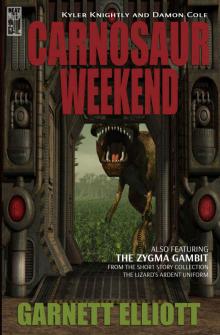 Carnosaur Weekend (Kyler Knightly and Damon Cole Book 1)
Carnosaur Weekend (Kyler Knightly and Damon Cole Book 1)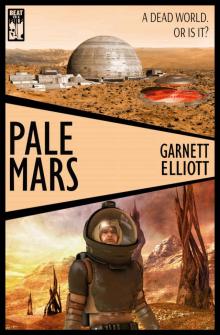 Pale Mars
Pale Mars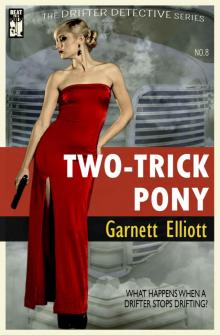 Two-Trick Pony (The Drifter Detective Book 8)
Two-Trick Pony (The Drifter Detective Book 8)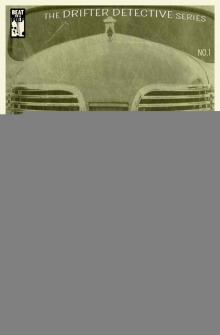 The Drifter Detective
The Drifter Detective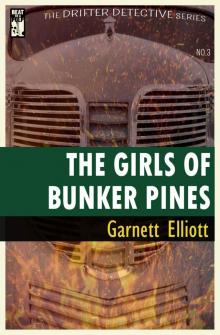 The Girls of Bunker Pines (The Drifter Detective Book 3)
The Girls of Bunker Pines (The Drifter Detective Book 3)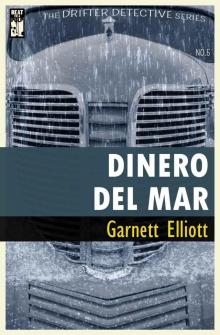 Dinero Del Mar (The Drifter Detective Book 5)
Dinero Del Mar (The Drifter Detective Book 5)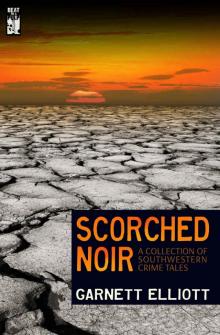 Scorched Noir
Scorched Noir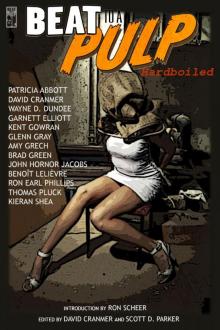 BEAT to a PULP: Hardboiled
BEAT to a PULP: Hardboiled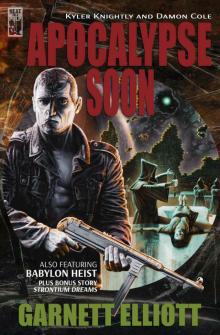 Apocalypse Soon (Kyler Knightly and Damon Cole Book 2)
Apocalypse Soon (Kyler Knightly and Damon Cole Book 2)